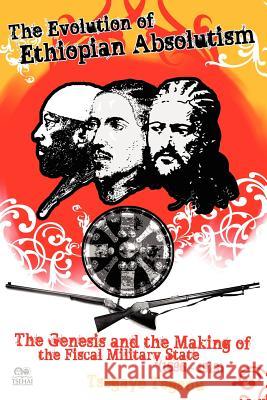The Evolution of Ethiopian Absolutism: The Genesis and the Making of the Fiscal Military State, 1696-1913 » książka
The Evolution of Ethiopian Absolutism: The Genesis and the Making of the Fiscal Military State, 1696-1913
ISBN-13: 9781599070209 / Angielski / Miękka / 2007 / 296 str.
The Evolution of Ethiopian Absolutism: The Genesis and the Making of the Fiscal Military State, 1696-1913
ISBN-13: 9781599070209 / Angielski / Miękka / 2007 / 296 str.
(netto: 95,36 VAT: 5%)
Najniższa cena z 30 dni: 99,30
ok. 16-18 dni roboczych.
Darmowa dostawa!
This book synthesis the development of the Ethiopian state and society at a particular historical stage: the appearance of a new type of power centralization synchronized with Ethiopia's integration into an international state system and capitalist world economy. Adopting a system approach and analysis as a method of cognition, this book reviews major interpretation of the historical process and presents an alternative understanding as well as explanation of the period. It identifies the distinct fiscal systems of the state, reveals the secrets of the Ethiopian independence and presents a fresh view on the structural problems of economic development. The work is based on a wide range of primary source materials and most essential literature. The empirical data are analysed within an elaborated hypothesis and theoretical framework to attain reliable information. Praise for this Book: Tsegaye Tegenu's book is a work of painstaking research which deserves the attention of all those engaged in the study of the economic basis of the Ethiopian state. The author sets out to identify and explain the resource base of the Ethiopian state during its process of organizing into a centralised power in the period 1696 to 1913, and he succeeds considerably in this respect by marshalling a vast array of Ethiopian and foreign sources. .The subject dealt within the book is vast in scope and intractable in nature. The author is to be commended for addressing the issues with remarkable conscientiousness and a reasonable degree of competence, Moreover, the work is underpinned by a wide reading on the theory and historiography of the subject.. --Professor Bahru Zewde, Addis Ababa University Tsegaye Tegenu's The Evolution of Ethiopian Absolutism is a carefully argued account of the origins of the modern Ethiopian state. It stresses that the foundations of the modern Ethiopian state rested on an increased military capacity, rather than on reforms which might promote economic development. --Professor Donald Crummey, University of Illinois at Urbana-Champaign This book makes an important contribution to an understanding of the development of Ethiopian statehood in the two centuries preceding the rise of Haile Selassie. As the subtitle indicates., the author is concerned with the means by which Ethiopian rulers extracted from the economy the resources required to maintain a substantial military apparatus. .The book does clearly convey the existence of a systematised process of revenue collection that dispels any impression that the Ethiopian state merely depended on the extraction of resources from looting peripheral territories.The author has achieved a vastly more impressive level of original research (which can develop) into a path-breaking reappraisal of the fiscal bases of the Ethiopian state.. --Professor Christopher Clapham, Lancaster University
This book synthesis the development of the Ethiopian state and society at a particular historical stage: the appearance of a new type of power centralization synchronized with Ethiopias integration into an international state system and capitalist world economy. Adopting a system approach and analysis as a method of cognition, this book reviews major interpretation of the historical process and presents an alternative understanding as well as explanation of the period. It identifies the distinct fiscal systems of the state, reveals the secrets of the Ethiopian independence and presents a fresh view on the structural problems of economic development. The work is based on a wide range of primary source materials and most essential literature. The empirical data are analysed within an elaborated hypothesis and theoretical framework to attain reliable information. Praise for this Book:Tsegaye Tegenus book is a work of painstaking research which deserves the attention of all those engaged in the study of the economic basis of the Ethiopian state. The author sets out to identify and explain the resource base of the Ethiopian state during its process of organizing into a centralised power in the period 1696 to 1913, and he succeeds considerably in this respect by marshalling a vast array of Ethiopian and foreign sources. .The subject dealt within the book is vast in scope and intractable in nature. The author is to be commended for addressing the issues with remarkable conscientiousness and a reasonable degree of competence, Moreover, the work is underpinned by a wide reading on the theory and historiography of the subject.. --Professor Bahru Zewde, Addis Ababa UniversityTsegaye Tegenus The Evolution of Ethiopian Absolutism is a carefully argued account of the origins of the modern Ethiopian state. It stresses that the foundations of the modern Ethiopian state rested on an increased military capacity, rather than on reforms which might promote economic development.--Professor Donald Crummey, University of Illinois at Urbana-ChampaignThis book makes an important contribution to an understanding of the development of Ethiopian statehood in the two centuries preceding the rise of Haile Selassie. As the subtitle indicates., the author is concerned with the means by which Ethiopian rulers extracted from the economy the resources required to maintain a substantial military apparatus. .The book does clearly convey the existence of a systematised process of revenue collection that dispels any impression that the Ethiopian state merely depended on the extraction of resources from looting peripheral territories.The author has achieved a vastly more impressive level of original research (which can develop) into a path-breaking reappraisal of the fiscal bases of the Ethiopian state..--Professor Christopher Clapham, Lancaster University











